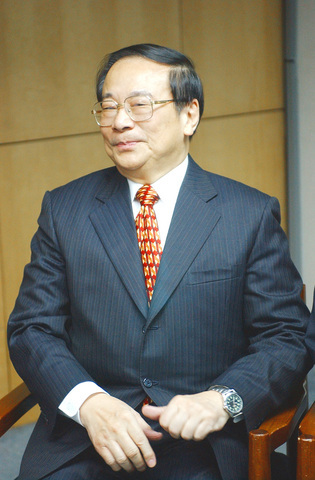Chang Chun-hsiung (
The party's former head, Su Tseng-chang (
In a story reported yesterday by a local Chinese-language newspaper, the China Times, President Chen Shui-bian (

PHOTO: CNA
TV reports
A local TV station, meanwhile, reported that Chang had been summoned to the presidential office and showed footage of Chang's car being driven into the office grounds yesterday morning.
Chang, however, denied the reports in a telephone interview, saying that it was not his intention or plan to take up the post of DPP chairman.
"I haven't been to the presidential office today," Chang said yesterday afternoon.
Chang, who was re-elected as the SEF's chairman last Friday, said he will devote himself wholly to the foundation's affairs.
The SEF is a quasi-official body established as the mechanism to handle cross-strait interactions in the absence of official ties between the two sides of the Taiwan Strait.
Chang is a DPP heavyweight and since Chen came to power in 2000 has served as the secretary-general of the presidential office, the premier and the secretary-general of the DPP. He is also a DPP legislator-at-large.
Speaking of the party's debacle, Chang said "we have to face up to the failure and make up our mind to examine ourselves."
Chang said the electoral result represented the feelings of the public, adding that the party had fallen out of favor as it had lost touch with its initial goals of clean governance and localized policy.
"The only way to win back people's support is to reflect on ourselves," he said.
Tsai calls for review
Meanwhile, DPP Legislator Tsai Ing-wen (蔡英文) said yesterday that the party should review some fundamental matters, including administrative policies related to meeting the needs of the general public, in light of its defeat.
The DPP should face the cruel reality of being rejected by voters, and also review and perhaps overhaul its systems fundamentally -- such as the party's orientation, the distance between the party apparatus and the people, the gap between the DPP and its supporters, as well as how it plays its role as the ruling party, Tsai said.
Tsai made the comments during a meeting of the legislature's Finance Committee, where legislators and officials mainly discussed the implementation of the results of the first national economic conference, held Jan. 6, 2001, and a proposed second national economic conference.
Regarding the second national economic conference, Tsai, an academic-turned-legislator, said that dozens of issues can be tackled by the government and the private sector at the conference, slated to be held prior to the Lunar New Year, which falls on Jan. 29.
Tsai said the issues to be discussed at the conference should include how policies should be carried out, how the DPP should seek to cooperate with opposition parties, how to consolidate the public's will, and how to make members of the administrative team more efficient and train them better.
In last Saturday's elections, the DPP took only six of the 23 city mayor and county commissioner posts up for grabs, while the Chinese Nationalist Party (KMT) won 14, representing one of the biggest setbacks for the DPP since it became the ruling party in 2000.

‘DENIAL DEFENSE’: The US would increase its military presence with uncrewed ships, and submarines, while boosting defense in the Indo-Pacific, a Pete Hegseth memo said The US is reorienting its military strategy to focus primarily on deterring a potential Chinese invasion of Taiwan, a memo signed by US Secretary of Defense Pete Hegseth showed. The memo also called on Taiwan to increase its defense spending. The document, known as the “Interim National Defense Strategic Guidance,” was distributed this month and detailed the national defense plans of US President Donald Trump’s administration, an article in the Washington Post said on Saturday. It outlines how the US can prepare for a potential war with China and defend itself from threats in the “near abroad,” including Greenland and the Panama

A wild live dugong was found in Taiwan for the first time in 88 years, after it was accidentally caught by a fisher’s net on Tuesday in Yilan County’s Fenniaolin (粉鳥林). This is the first sighting of the species in Taiwan since 1937, having already been considered “extinct” in the country and considered as “vulnerable” by the International Union for Conservation of Nature. A fisher surnamed Chen (陳) went to Fenniaolin to collect the fish in his netting, but instead caught a 3m long, 500kg dugong. The fisher released the animal back into the wild, not realizing it was an endangered species at

The High Prosecutors’ Office yesterday withdrew an appeal against the acquittal of a former bank manager 22 years after his death, marking Taiwan’s first instance of prosecutors rendering posthumous justice to a wrongfully convicted defendant. Chu Ching-en (諸慶恩) — formerly a manager at the Taipei branch of BNP Paribas — was in 1999 accused by Weng Mao-chung (翁茂鍾), then-president of Chia Her Industrial Co, of forging a request for a fixed deposit of US$10 million by I-Hwa Industrial Co, a subsidiary of Chia Her, which was used as collateral. Chu was ruled not guilty in the first trial, but was found guilty

The Chinese Nationalist Party (KMT) is maintaining close ties with Beijing, the Democratic Progressive Party (DPP) said yesterday, hours after a new round of Chinese military drills in the Taiwan Strait began. Political parties in a democracy have a responsibility to be loyal to the nation and defend its sovereignty, DPP spokesman Justin Wu (吳崢) told a news conference in Taipei. His comments came hours after Beijing announced via Chinese state media that the Chinese People’s Liberation Army’s Eastern Theater Command was holding large-scale drills simulating a multi-pronged attack on Taiwan. Contrary to the KMT’s claims that it is staunchly anti-communist, KMT Deputy